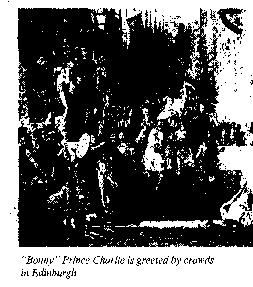
53
In 1717 one of the Whig ministers Robert Walpole (later known as the first Prime Minister) introduced "the
sinking fund" to be used to paying off the Debt from the taxes.
The South Sea Company, founded in 1711 to trade in slaves, offered to take over a large part of the Debt
which was followed by a great rise of the value of its shares. "The South sea bubble" burst up in 1720,
collapsed like a pitched bubble and ruined many investors.
Robert Walpole was called to remedy the financial situation in the country. In 1721 he became the first Prime
Minister and an outstanding statesman. The main objectives of his policy were peace and prosperity.
His motto was "let the sleeping dogs lie". He had been in office for twenty years and stabilized the financial
situation with the help of taxes imposed on goods sold within the country.
The taxes on tea and coffee were a success, but the taxes on wine and tobacco aroused protests of his
opponents and people in the country.
When George II became king (1727-1760), he continued his father's policy and relied upon R. Walpole as
Prime Minister. But the opponents from the Tones were attacking Walpole, especially the young talented
politician W. Pitt (the Elder), – and much against his will, the Prime Minister was forced to start a war against
Spain. But he didn't direct it properly in the opinion of his Parliamentary critics, and had to resign. But he
continued to have an influence on George II. Sir Robert Walpole became a very rich man, had a rich collection
of paintings which was sold by his grandson to Catherine the Great of Russia.
1745 was the year of another Jacobite attempt to restore the Stuarts. James, the Old Pretender, had been
recognized by the Scottish opposition as James III, toasts had been drunk "for the King beyond the sea", but
James was passive and didn't undertake any steps. His son and the grandson of James II, Charles Edward or the
Young Pretender, landed in Scotland together with his seven followers. They were enthusiastically greeted by
the Highlanders, who revolted in support of this romantic handsome young man and called him Bonny Prince
Charlie. The Jacobite rebels captured Edinburgh the capital of Scotland but failed to withstand the attacks of
the regular English army, they were defeated at the Cullodon Moor and scattered. Charles Edward escaped back
to France. The Highlanders were subjected to cruel punishments and repressions. The old clan system was
destroyed, it was forbidden to wear a kilt or to play bagpipes. Leaders were executed, many Highland families
left the country. The Highlanders were brought under the control of the central Government.
The most important opponent of Sir R. Walpole was William Pitt "the Elder", later Lord Chatham who was
determined to strengthen the economic power of Britain and to defeat France in the trade competition overseas.
He agreed with Daniel Defoe the author of Robinson Crusoe, who had written in 1728 "Trade is the wealth of
the world, trade makes the difference between rich and poor, between one nation and another".
When Lord Chatham became the secretary of state he directed British efforts at destroying French trade and
driving the French from North America; that policy culminated in the capture of Quebec, Montreal and other
triumphs of the "Year of Victory" (1759). In India the British became the masters of Bengal. India became the
"jewel of the Crown" of Britain's foreign possessions. In 1760 George II was succeeded by his grandson
George III (1760-1820). He was the first Hanoverian to be born in Britain. He declared himself Patriot King
and was determined to take a more active part in the government of the country. His Government, his Cabinet
included the Tones who were described as King's Friends.

